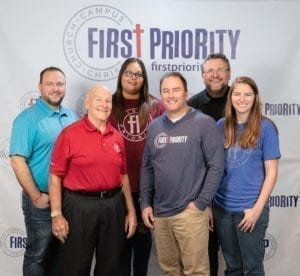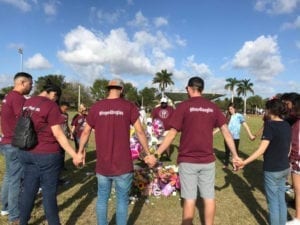
One of the greatest influences on a teenager is another teenager. “As adults we look back on our lives and recognize pretty much every dumb thing I did when I was a teenager was because a friend said, ‘Hey, let’s go do this!’ You did it because people had influence over you. First Priority is taking that from a negative to a positive, saying use your influence on your friends for Christ and here’s how you can do it,” explained Chris Lane, executive director of Frist Priority of South Florida.
Now in its twentieth year, First Priority helps students establish Bible clubs in public middle and high schools, connecting the Church to reach the campus for Christ. What started as a group of youth pastors who recognized the needed to equip, empower and encourage their students to reach their friends with the gospel has grown into a ministry with 230 clubs in public schools throughout Dade, Broward, and Palm Beach counties, reaching into the Treasure Coast.
A Spiritual battle
“We’re in the battle for the soul of man,” said Lane, “and the statistics in our community pretty much tell us that over 95 percent of these students that are on public school campuses are lost. So this is a mission field. It’s almost like an unreached people group, but the great thing is the missionaries speak the language, they know the culture and they go there 185 days a year – these students.”
Tragically, that battle became all too real on Valentine’s Day last year when a gunman took the lives of 17 people at Marjory Stoneman Douglas High School, which has been home to one of the inaugural First Priority Clubs for 20 years.
“Our club was definitely impacted because one of our first priority members, Helena Ramsey, was a victim in the shooting, which is awful and tragic to see a life cut short like that,” said Lane. “But, for the glory of God, her testimony lived on, and we were out there at the Parkland Park and Rec Association and gathered around her memorial cross in the ground. Students came and we were just ministering for those next days and weeks to come. It was good to know that there was not only a First Priority Club, but there was the Church coming together early on that campus.”

Acknowledging “It’s kinda hard to get through it,” Christle Vidor, a senior leader in the First Priority Club at Marjory Stoneman Douglas, emphasized, “I definitely want to express my thanks to First Priority for their unwavering, relentless support during what was the toughest part of mine and my peers’ life.”
Vidor said, “I came to First Priority looking to deepen my relationship with God, and my campus coaches truly modeled how someone can live in this era while living for Jesus.” It also taught her to be a leader. “I was the type of person who would shake uncontrollably during an oral report, and now I lead the 45-minute First Priority meetings,” said Vidor. “It’s given me the platform to undertake amazing endeavors. I organized a school-wide clothing drive and a Christmas party in which members wrote letters to adolescents in juvenile delinquent centers. First Priority pushed me to come out of my own insecurities and spread the Word of God for the Kingdom.”
The EPIC program
So what does a First Priority Club look like? Lane explained, “It’s a three-week strategy on campus called EPIC, and it stands for Equip, Proclaim and Connect. I know there’s an “I” in there and that means in prayer – all the time we’re in prayer. During Equip week, we equip students on how to share their faith. We developed a gospel narrative presentation called Three Crowns, and we teach kids how to do that.”
They also learn how to pray for their unsaved friends. “They have these little prayer cards that we’ve developed, and they are challenged to be praying for five of their friends all of the time,” said Lane. “The concept is the more I talk to God about my unsaved friends, the more likely I am to talk to my unsaved friends about God.”
The next week is the P week or Proclaim week or some people call it Pizza week. “It’s hard to say that because some schools have donuts and some schools have tacos, but that’s the week where you are strategically inviting your five friends that you have been praying for to come to this meeting. It’s going to be a little bit of an up tempo environment, some Christian music playing, maybe some giveaways or a little contest as people come in, and there’s going to be a proclamation of the gospel – Proclaim week – and usually a guest speaker, a youth pastor or a student. It’s really up to them. It’s student led and those students are inviting people for the gospel to be shared, and then an opportunity is given to put faith in Jesus. If someone receives Christ, we want to make sure they come back next week to Connect week where they’re getting connected to God, connected to the Church and connected to club.”
A timeless message
While they have used different acronyms to describe their club activities over the years, the strategy has essentially remained the same for two decades.
“I think the needs of students always have been and always will be the same,” said Lane. “They are searching for their identity. Who am I? How do I fit in? Does anybody care? Is there a plan for me? Am I just some number in this vast universe? And that’s what’s so great about the gospel. The gospel is the exact answer for all those things. You do matter to God. He demonstrated His love for us in that while we were yet sinners, Christ Jesus died for us. He offers us the greatest thing we need and that is the forgiveness of sins, so that we can be at peace with God. There is hope and that hope is heaven. That doesn’t mean everything is going to be great here on earth. It doesn’t mean school is not going to be hard or I won’t get a sickness or tragedies won’t happen, but there is a light at the end of the tunnel and that is hope of heaven. And it’s through Jesus.”
Fred Revell, associate director of First Priority, said they’ve witnessed some generational changes over the years. “Millennials were born right at the time we started and now we have Gen Z’s… The major real change is what technology has done… certainly the media, the computer, the pocket concept… the competition for students’ attention…” But he asserted, “The thing that has not changed through all of these years is relationship, authenticity, value and connection.”
It’s about relationship
The one thing that has never changed is the importance of spending quality time with students and building relationships.
“As I think of my life as a student when I went to Cooper City High and grew up in youth group, it is the valued relationship I had with a youth pastor that stayed and laid the foundation for my future. And the core thing is a relationship with Jesus,” said Revell.
He referred to what author Terry A. Smith calls “Hospitable Leadership” as First Priority’s strength. “The one thing that is true across all ethnic groups is home. Everybody wants to go home. We even talk about going home to heaven, and the closer you get to home the more real connection you have. It’s about hospitality, welcoming the stranger, and that’s what First Priority has been all this time, in an inhospitable and even a hostile environment sometimes… Ultimately the hospitality, the vivaciousness and the infectiousness of Christian love will impact people. People are longing for that, and they are not getting it on Facebook, and they’re not getting it on Twitter or all these other things.”
This was evident to Daniela “Dani” Santiago, a high school senior who joined the First Priority Club at Marjory Stoneman Douglas High School after being invited by a friend a year and a half ago. She said she stayed when she discovered, “everybody was just so nice and made me feel so welcome, like a small family.” But the thing she said has impacted her the most is, “It gives me an outlet to talk about my feelings and things going on in my life.”
A campus mentor at Marjorie Stoneman Douglas and youth pastor at Coastal Community Church, Susie LaForge said, “First Priority has been a safe place for students to share what they’re going through and to really relate with one another in an environment where Scripture is brought up, and we talk about the things God offers… First Priority is a club on campus that allows for prayer. I truly believe prayer changes atmospheres and has the potential to start a movement and change the culture on campus… You bring Christ to campus, but then you also connect them back to a local church so they can grow as a believer, and we have seen that,” she added.
Get involved
When asked how people can you get involved, Lane said, “I think 2019 is an opportunity for us to grow further and faster. People can continue to pray. I think awareness is really important. When people drive by schools or when they see kids in the neighborhood, ask them if they go to first Priority. Point people there. And we need the Church; youth leaders, pastors, everybody can get engaged.”
To find out more about First Priority and where clubs are meeting, visit firstpriority.cc
Read last month’s article by Shelly Pond at: https://www.goodnewsfl.org/revealing-the-dark-truth-about-human-trafficking/

Comments